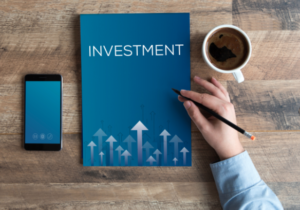What is investing and how does it work?
 Investing is buying an asset, such as stocks & shares, bonds or property, with the hope of a potential return that is greater than if you had kept your money in a bank account. Investment returns are usually not guaranteed, and as such, you have a greater potential for losing some or all of your money. When you invest your money, you try to balance the risks and potential for greater reward.
Investing is buying an asset, such as stocks & shares, bonds or property, with the hope of a potential return that is greater than if you had kept your money in a bank account. Investment returns are usually not guaranteed, and as such, you have a greater potential for losing some or all of your money. When you invest your money, you try to balance the risks and potential for greater reward.
When you hold your money in cash, whilst it may be secure, the buying power of the cash will be eroded by the effect of inflation (rising prices) over time. You do have the choice of securing a higher interest rate on your money by locking it away (i.e. by using a fixed-term savings account) but this higher return may still be below the historical rate of inflation (which is between 2-3% per annum).
Remember that the higher the potential investment return, the greater the investment risk you will have to take. This higher risk could result in you losing some or all of your original investment.
Book a free financial review
Looking to ensure your finances are on track? Our partner Unbiased will arrange for a qualified, FCA-regulated adviser to contact you
- Discuss your financial situation
- Identify what steps, if any, you should take
- Free and without obligation

What assets should I invest in?
Most investors usually invest in company shares and bonds. More experienced investors may invest in other assets such as commodities (i.e. gold) or property. In this article, I will focus on the two main asset classes that you will likely invest in: shares and bonds. You can invest in these assets directly, which means you buy and own them individually, or you invest in them indirectly via funds.
Investing directly
Shares
A share is essentially a small part of a company that is sold at a price that fluctuates in real time depending on investors' demand for the share. The demand for a share can be affected by a number of factors such as company performance, earnings, profitability, outlook or wider economic influences.
Bonds
Bonds are issued by governments and corporations when they want to raise money. By buying a bond, you're giving the issuer a loan, and they agree to pay you back the face value of the loan on a specific date and to pay you periodic interest payments, called coupons. Bonds are traded on the bond market and the price can fluctuate again due to supply and demand.
Investing indirectly
Funds
A fund is a pool of money from a number of different investors (usually thousands of different people) and a fund manager invests this money in a selection of investments aimed at spreading risk and achieving a better return. Funds basically create a portfolio of investments in a certain asset class, sector or geographic location. Active funds are managed by a fund manager according to an agreed mandate and investors are charged an annual fee to invest in the fund. Computer algorithms run passive funds and usually track an index such as the FTSE 100, which is the headline index for UK shares. Funds are the usual way most DIY investors invest their money as it is cost-effective, easy to do and allows you to build a diversified portfolio across a range of asset classes.
Why should I invest?
When you want to accumulate savings the first option should be to put your cash in a savings account with a bank or building society to provide both security and easy access when needed. However, when you are planning for the longer-term (more than 5 years) it makes sense to try and obtain a better return on your savings. Cash savings do not fare well when the rate of inflation is taken into consideration and the buying power of your savings will diminish over time.
So starting to invest over the long term makes perfect sense and it is worth remembering that if you are a member of a company pension scheme then you are already investing money to provide you with an income in retirement, you just may not have realised it. To give you some context, equities have historically produced an average annual return of 5% above inflation. Of course, that masks some large swings - both up and down.
Investing is no longer a pursuit for only those with large resources and is now accessible to everyone thanks to the abundance of online investment services. Investors can open an online account in just a few minutes, starting with a low monthly amount or a small cash sum. We explain more about such services below.
How can I start investing?
When you want to start investing you should firstly take advantage of the tax reliefs available within certain investment products, as these reliefs will help your investments grow quicker. I briefly explain each investment product below. But assuming that you are already a member of your employer's pension scheme through auto-enrolment and are maximising your employers' contributions then for most people a Stock and Shares ISA would be where they would look to start investing. Remember a pension or Stocks & Shares ISA is just an empty box with tax advantages into which you place your investments (i.e. funds). For more, check out our article 'How to start investing'.
ISAs
There are 4 types of ISAs available; a Cash ISA, a Stocks & Share ISA, an Innovative Finance ISA and a Lifetime ISA. There is no tax relief on contributions into an ISA but there is no tax on withdrawals (unlike pensions). Each tax year you can invest money into one of each of the aforementioned types of ISA up to a combined maximum of £20,000. You can also separately invest money for your children in a Junior ISA. Here's a brief round-up of how each type of ISA works.
Cash ISA, Stocks & shares ISA
No tax is payable on the interest in a cash ISA and no income tax or capital gains tax is payable from investments placed in a stocks & shares ISA.
Lifetime ISA
You must be age 18 and under 40 and can only pay £4,000 into a Lifetime ISA in each tax year up until the age of 50. The government will pay a 25% bonus on your contributions and you can withdraw your investment to either purchase your first property or for any other reason once you have reached the age of 60. If you withdraw your money for any other reason you will incur a penalty which effectively eliminates the government bonus.
Junior ISA
You can invest up to £9,000 per tax year into a Junior ISA for a child if you are a parent or guardian. Children automatically taking ownership of the investment at the age of 18. For more details read our article 'Best Junior stocks & shares ISA'.
Pension
If you contribute to a pension, you qualify for tax relief on these contributions at your marginal rate of tax. For instance, if you are a basic rate taxpayer and invest £80 per month into a pension then your pension provider will receive a further £20 from the government that will top up your pension. If you are a higher or upper rate taxpayer then you will receive further tax relief on completion of your annual tax return.
What assets should I invest in?
Assuming you've chosen your investment product (i.e a Stocks & Shares ISA) now you need to choose what to put in it (i.e. what investments). As a beginner looking to invest in the stock market I would suggest investing in funds. As mentioned, a fund pools investors' money in order to purchase investment assets such as shares or bonds. When you invest in a fund your money buys units in that fund, the price of which will fluctuate in line with the prices of the underlying assets in that fund. The main benefit of investing in funds is that you are investing in a portfolio of assets rather than a single asset and this will spread the investment risk.
We have designed an investment portfolio calculator which can show you an example portfolio of how your assets might be spread across a range of asset classes and how much could be invested in each. It is not advice and is for guidance only. In order to gain exposure to an asset such as European equities, which might be listed, you could buy a European equity unit trust fund for example. Similarly, to gain access to UK equities you could allocate some money to a UK equity fund.
Whether you know which funds/assets you want to buy or not at this point you essentially have two choices, GSI (get someone in to do the investing for you) or DIY (do it yourself). I explain these options in the next section.
Who should I invest with?
When you invest your money you have to decide whether you want someone to run your money for you while you sit back and relax or do it yourself. Below I look at both options:
Let someone invest the money for you
This route is the easiest option and is becoming increasingly popular. You leave the investment asset choices and fund-buying to someone else whose job and expertise is to invest money on behalf of their customers. Historically, this option was only available to wealthy individuals with lots of money to invest. But thanks to technology and increased competition, anyone can now begin investing with as little as £1 and gain the same quality of expertise and investment choice as the wealthy. These online services, which have opened up investing to the masses, are called robo-advisers.
Robo-advice services such as Wealthify, Moneyfarm and Nutmeg allow you to easily monitor and make changes to your investments via an app. We provide more information about these services, explaining how they work, how much they cost as well as a breakdown of each provider in our article 'Which is the best robo-adviser in the UK?'.
Robo-advice services provide a simple investing solution that offers value for money and is primarily targeted at people who are new to investing or who simply don't have the time to manage their own investments. There are other similar services out there and you can see a round-up of these along with our ratings in our best buy table.
Investment platforms and apps (Do it yourself)
If you want to pick your investments yourself then you need an online investment platform or app where you select the assets you wish to invest in as well as monitor the performance. The ownership of the units in each fund remains yours and is held in trust and protected under the Financial Services Compensation Scheme up to a sum of £85,000 with each institution. Each investment platform or investment app will charge fees for holding your investments, and some with charge you for buying and selling your investments. Fees vary between platforms, so you should check out the costs before you commit to one platform. I suggest reading our comprehensive article - 'Compare the cheapest (and best) investment ISA platforms' - if you want to go down the DIY route.
There is plenty of information available out there to help you select the funds for your portfolio with many investment platforms offering a range of tools and articles which are a great resource to get you started. I would also suggest reading our comprehensive article - 'The best performing funds to invest in right now' - but also have a look at our 80-20 Investor service.
Things to consider before investing
Make sure you have covered the financial basics first
Before you consider investing you should have paid off your short term debts first. The interest charged on these debts will often far outweigh the returns that can be achieved from investing. You should also have built up an emergency fund (ideally of 3 to 6 months' income) to cover any unexpected expenses so you do not end up having to liquidate any investments to pay for these.
Investment is for the long term
Investing for the future is a long term operation, so you should only invest money that you do not need access to for the next 5 years at least. Your investments can go down as well as up so if this happens you will need a decent timescale to allow them to return to growth.
Do some research
If you are considering investing for the first time then I also suggest you start reading about how investing works and understand what influences stock markets. Find the money sections in your chosen newspaper, or online, and start reading them regularly. You may find certain concepts are difficult to grasp but keep going and things will fall into place. Alternatively, sign up to our weekly newsletter where we highlight the best money and property sections from a range of Sunday papers as well as a roundup of all of our Money to the Masses articles from that week.
I also recommend that you listen to the weekly podcast and YouTube shows that we produce:
- Damien's market update - In this short, monthly YouTube show, Damien gives his take on what has happened in the investment world over the last month - a great way to start understanding how markets work.
- Money To The Masses Podcast - Damien is joined by Deputy Editor Andy Leeks every week for a chat about all things money, covering 3 or 4 topics each week that can help listeners take control of their finances.
- Money to the Masses YouTube channel - New videos updated every week covering a variety of personal finance topics




